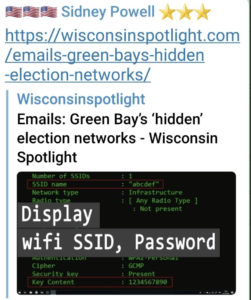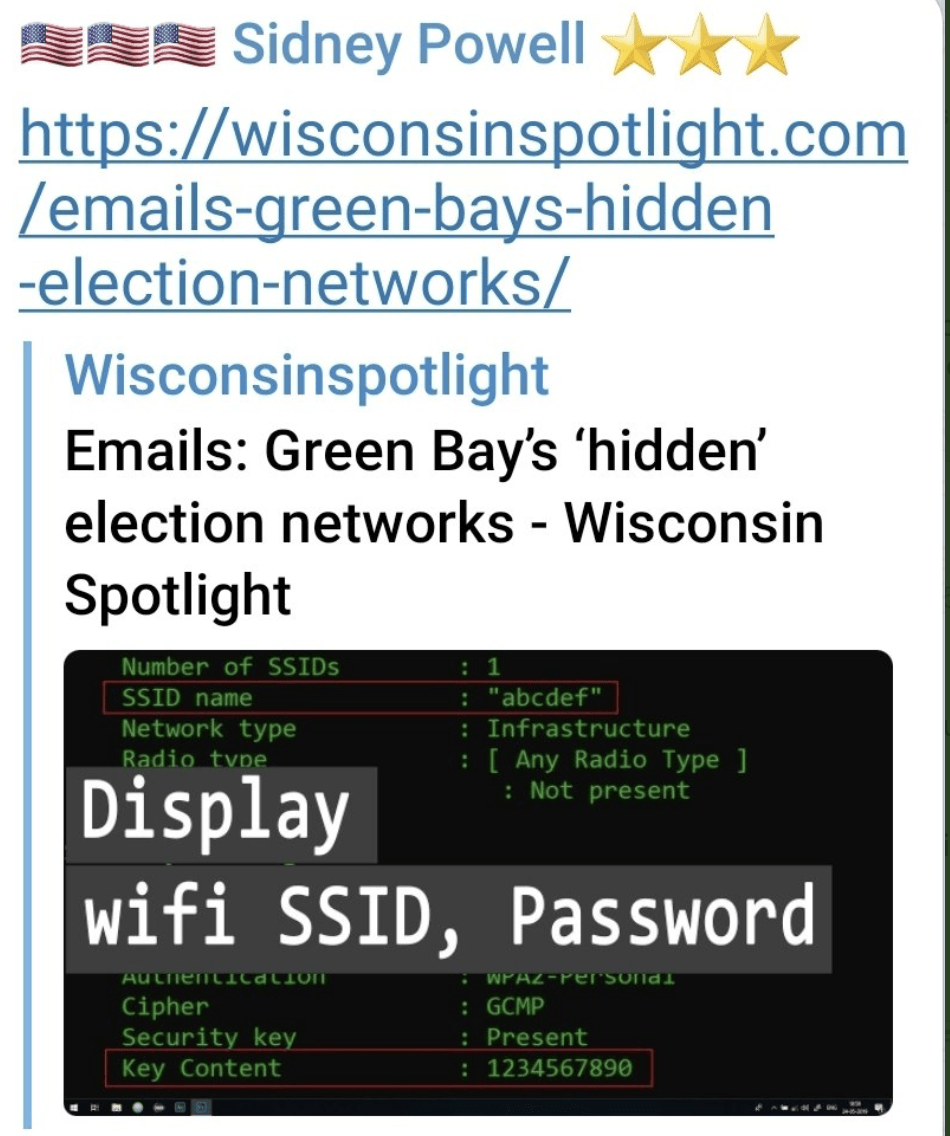GREEN BAY’S ‘HIDDEN’ ELECTION NETWORKS

By M.D. Kittle
A former Democratic operative intricately involved in Green Bay’s November election was given access to “hidden” identifiers for the internet network at the hotel convention center where ballots were counted, according to new emails obtained by Wisconsin Spotlight.
Green Bay city officials insist the presidential election was “administered exclusively by City staff.” But the emails show Michael Spitzer-Rubenstein, Wisconsin State lead for the National Vote at Home Institute, had a troubling amount of contact with election administration.
“I’ll have my team create two separate SSID’s for you,” Trent Jameson, director of Event Technology at Green Bay’s Hyatt Regency and KI Convention Center, where the city Central Count was located on Election Day, wrote to Spitzer-Rubenstein.
SSID stands for Service Set Identifier. It’s an internet network’s name. Open up the list of Wi-FI networks on your laptop or phone, the list of SSIDs will pop up. Wireless router or access points broadcast SSIDs so nearby devices can find and display any available networks.
SSID hiding keeps the network name from being publicly broadcast. The SSID won’t immediately pop up in the display, although the network name remains available for use.
“One SSID will be hidden and it’s: 2020vote. There will be no password or splash page for this one and it should only be used for the sensitive machines that need to be connected to the internet,” Jameson wrote in his Oct. 27 email to Spitzer-Rubenstein. He in turn forwarded the email to Celestine Jeffreys, Mayor Eric Genrich’s chief of staff, on Oct. 30.
Also on the email were, Amaad Rivera-Wagner, the mayor’s community liaison; Jaime Fuge, Green Bay’s chief election inspector at the time; Shelby Edlebeck, multimedia communications specialist; and Mike Hronek, the city’s Information Technology Services administrator.
“The other SSID will be: gbvote and that one can be seen in the settings app of your phone or laptop under ‘networks’ and should be used for the poll workers who need internet,” Jameson wrote.
Jameson told Spitzer-Rubenstein there would be a third SSID, which was to be used by media or other guests “not part of your team.”
Why would a guy who has been described as a consultant or adviser to the city need to have hidden SSIDs? Why would the city want him to have knowledge of Service Set Identifers for “sensitive machines”? He was brought in to provide technical support, but why would Spitzer-Rubenstein receive such sensitive information before the city’s IT director and the clerk’s office?
Genrich, Green Bay’s mayor, did not return Wisconsin Spotlight’s call seeking comment.
As Wisconsin Spotlight first reported, Spitzer-Rubenstein and his National Vote at Home Institute were heavily involved in Green Bay’s election process.
The National Vote at Home Institute, was one of several private, left-leaning groups, funded largely by Facebook CEO Mark Zuckerberg. Spitzer-Rubenstein, with an impressive political resume working for Democratic politicians and campaigns, had significant influence over the administration of the presidential election in Green Bay and, it appears, in Milwaukee. The Chicago-based Center for Tech and Civic Life received hundreds of millions of dollars in funding from Zuckerberg and his wife, money they pumped out in big grants to to cities in the name of “safe elections.”
Spitzer-Rubenstein appears to have played point man for the coordinated effort between the “Wisconsin 5,” Milwaukee, Madison, Green Bay, Kenosha and Racine — which received a combined $6.3 million in Zuckerberg money.
Emails show Spitzer-Rubenstein offered to correct or “cure” ballots in Green Bay, and he told the city’s clerk that he had come up with a similar process for Milwaukee.
And despite the city’s assertions that Spitzer-Rubenstein did not have the keys to the KI Center where the absentee ballots were, a hotel contract obtained by Wisconsin Spotlight shows the keys were to be delivered to Spitzer-Rubenstein.
“Michael Spitzer-Rubenstein will be the onsite contact for the group,” the hotel instructions state.
Emails show him inside the KI Center asking city officials about where the ballots would be located.
“Are the ballots going to be in trays/boxes within the bin? I’m at KI now, trying to figure out whether we’ll need to move the bins throughout the day or if we can just stick them along the wall and use trays or something similar to move the ballots between stations,” Spitzer-Rubenstein wrote to city officials two days before the election.
There’s much more.
Sandy Juno, former Brown County clerk who has accused the city of Green Bay of going “rogue” in its handling of the election, said she found the use of the secretive internet access points “unusual.” Spitzer-Rubenstein is shown in photos working on a laptop by a printer at central count on election night.
“I’m not sure what the need was for all of those different (Service Set) IDs, but the one that bothered me most was for the ‘sensitive machines,’ Juno said.
Reproduced from The Daily Signal with permission. Original here. Originally published by Wisconsin Spotlight a website of EMPOWER WISCONSIN FOUNDATION.
